#Children poets
Explore tagged Tumblr posts
Text
Writing Notes: Children's Dialogue
Language is extremely complex, yet children already know most of the grammar of their native language(s) before they are 5 years old.
BABBLING
Babbling begins at about 6 months and is considered the earliest stage of language acquisition
By 1 year babbles are composed only of the phonemes used in the language(s) they hear
Deaf babies babble with their hands like hearing babies babble using sounds
FIRST WORDS
After the age of one, children figure out that sounds are related to meanings and start to produce their first words
Usually children go through a holophrastic stage, where their one-word utterances may convey more meaning
Example: "Up" is used to indicate something in the sky or to mean “pick me up”
Most common first words (among the first 10 words uttered in many languages): “mommy,” “daddy,” “woof woof,” “no,” “bye,” “hi,” “yes,” “vroom,” “ball” and “banana”
WORD MEANINGS
When learning words, children often overextend a word’s meaning
Example: Using the word dog to refer to any furry, four-legged animal (overextensions tend to be based on shape, size, or texture, but never color)
They may also underextend a word’s meaning
Example: Using the word dog to refer only to the family pet, as if dog were a proper noun
The Whole Object Principle: When a child learns a new word, (s)he is likely to interpret the word to refer to a whole object rather than one of its parts
SYNTAX
At about two years of age, children start to put words together to form two-word utterances
The intonation contour extends over the two words as a unit, and the two-word utterances can convey a range of meanings:
Example: "mommy sock" = subject + object or possessive
NOTE: Chronological age is NOT a good measure of linguistic development due to individual differences, so instead linguists use the child’s mean length of utterance (MLU) to measure development
The telegraphic stage describes a phase when children tend to omit function morphemes such as articles, subject pronouns, auxiliaries, and verbal inflection
Examples: "He play little tune" or "Andrew want that"
Between 2;6 and 3;6 a language explosion occurs and children undergo rapid development
By the age of 3, most children consistently use function morphemes and can produce complex syntactic structures:
Examples: "He was stuck and I got him out" / "It’s too early for us to eat"
After 3;6 children can produce wh-questions, and relative pronouns
Sometime after 4;0 children have acquired most of the adult syntactic competence
PRAGMATICS
Deixis: Children often have problems with the shifting reference of pronouns
Children may refer to themselves as "you"
Problems with the context-dependent nature of deictic words: Children often assume the hearer knows who s/he is talking about
AUXILIARIES
In the telegraphic stage, children often omit auxiliaries from their speech but can form questions (with rising intonation) and negative sentences
Examples: "I ride train?" / "I not like this book"
As children acquire auxiliaries in questions and negative sentences, they generally use them correctly
SIGNED LANGUAGES
Deaf babies acquire sign language in the same way that hearing babies acquire spoken language: babbling, holophrastic stage, telegraphic stage
When deaf babies are not exposed to sign language, they will create their own signs, complete with systematic rules
IMITATION, REINFORCEMENT, ANALOGY
Children do imitate the speech heard around them to a certain extent, but language acquisition goes beyond imitation
Children produce utterances that they never hear from adults around them, such as "holded" or "tooths"
Children cannot imitate adults fully while acquiring grammar
Example:
Adult: "Where can I put them?" Child: "Where I can put them?"
Children who develop the ability to speak later in their childhood can understand the language spoken around them even if they cannot imitate it
NOTE: Children May Resist Correction
Example: Cazden (1972) (observation attributed to Jean Berko Gleason) – My teacher holded the baby rabbits and we patted them. – Did you say your teacher held the baby rabbits? – Yes. – What did you say she did? – She holded the baby rabbits and we patted them. – Did you say she held them tightly? – No, she holded them loosely.
Another theory asserts that children hear a sentence and then use it as a model to form other sentences by analogy
But while analogy may work in some situations, certainly not in all situations:
– I painted a red barn. – I painted a barn red. – I saw a red barn. – I saw a barn red.
Children never make mistakes of this kind based on analogy which shows that they understand structure dependency at a very young age
BIRTH ORDER
Children’s birth order may affect their speech.
Firstborns often speak earlier than later-born children, most likely because they get more one-on-one attention from parents.
They favor different words than their siblings.
Whereas firstborns gabble on about animals and favorite colors, the rest of the pack cut to the chase with “brother,” “sister,” “hate” and such treats as “candy,” “popsicles” and “donuts.”
The social dynamics of siblings, it would appear, prime their vocabularies for a reality different than the firstborns’ idyllic world of sheep, owls, the green of the earth and the blue of the sky.
MOTHER'S LEVEL OF EDUCATION
Children may adopt vocabulary quite differently depending on their mother’s level of education.
In American English, among the words disproportionately favored by the children of mothers who have not completed secondary education are: “so,” “walker,” “gum,” “candy,” “each,” “could,” “wish,” “but,” “penny” and “be” (ordered starting with the highest frequency).
The words favored by the children of mothers in the “college and above” category are: “sheep,” “giraffe,” “cockadoodledoo,” “quack quack,” the babysitter’s name, “gentle,” “owl,” “zebra,” “play dough” and “mittens.”
BOYS / GIRLS
One area of remarkable consistency across language groups is the degree to which the language of children is gendered.
The words more likely to be used by American girls than by boys are: “dress,” “vagina,” “tights,” “doll,” “necklace,” “pretty,” “underpants,” “purse,” “girl” and “sweater.”
Whereas those favored by boys are “penis,” “vroom,” “tractor,” “truck,” “hammer,” “bat,” “dump,” “firetruck,” “police” and “motorcycle.”
Tips for Writing Children's Dialogue (compiled from various sources cited below):
Milestones - The dialogue you write should be consistent with the child's developmental milestones for their age. Of course, other factors should be considered such as if the child has any speech or intellectual difficulties. Also note that developmental milestones are not set in stone and each child is unique in their own way.
Too "Cutesy" - If your child characters are going to be cute, they must be cute naturally through the force of their personality, not because the entire purpose of their existence is to be adorable.
Too Wise - It’s true kids have the benefit of seeing some situations a little more objectively than adults. But when they start calmly and unwittingly spouting all the answers, the results often seem more clichéd and convenient than impressive or ironic.
Unintelligent - Don’t confuse a child’s lack of experience with lack of intelligence.
Baby Talk - Don’t make a habit of letting them misuse words. Children are more intelligent than most people think.
Unique Individuals - Adults often tend to lump all children into a single category: cute, small, loud, and occasionally annoying. Look beyond the stereotype.
Personal Goals - The single ingredient that transforms someone from a static character to a dynamic character is a goal. It can be easy to forget kids also have goals. Kids are arguably even more defined by their goals than are adults. Kids want something every waking minute. Their entire existence is wrapped up in wanting something and figuring out how to get it.
Don't Forget your Character IS a Child - Most of the pitfalls in how to write child characters have to do with making them too simplistic and childish. But don’t fall into the opposite trap either: don’t create child characters who are essentially adults in little bodies.
Your Personal Observation - To write dialogue that truly sounds like it could come from a child, start by being an attentive listener. Spend time around children and observe how they interact with their peers and adults. You can also study other pieces of media that show/write about children's behaviour (e.g., documentaries, films, TV shows, even other written works like novels and scripts).
Context - The context in which children speak is crucial to creating realistic dialogue. Consider their environment, who they're speaking to, and what's happening around them. Dialogue can change drastically depending on whether a child is talking to a friend, a parent, or a teacher. Additionally, children's language can be influenced by their cultural background, family dynamics, and personal experiences. Make sure the context informs the dialogue, lending credibility to your characters' voices.
Sources and other related articles: 1 2 3 4 5 6 7 8 9 10
Writing Notes: On Children ⚜ Childhood Bilingualism More: Writing Notes & References
#writing prompt#writeblr#writers on tumblr#spilled ink#poets on tumblr#writing notes#children#writing tips#literature#writing advice#writing reference#studyblr#langblr#linguistics#dark academia#dialogue#writing resources
4K notes
·
View notes
Text
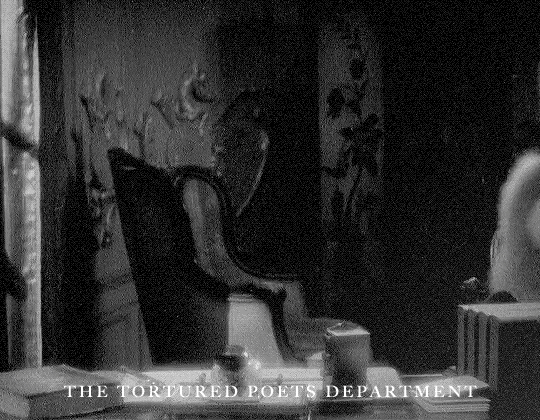

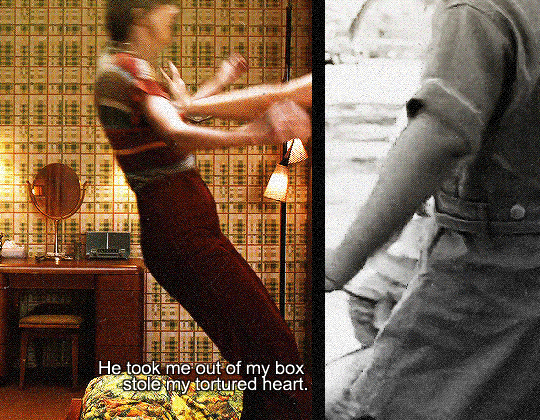

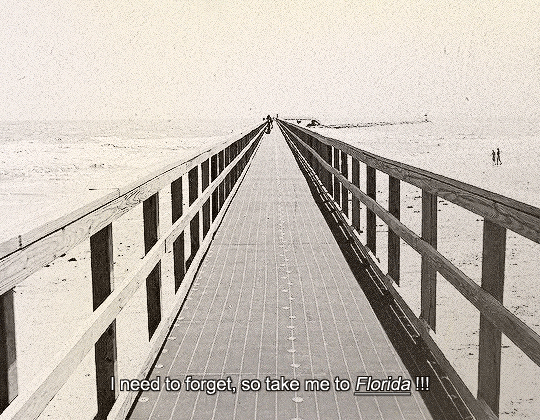
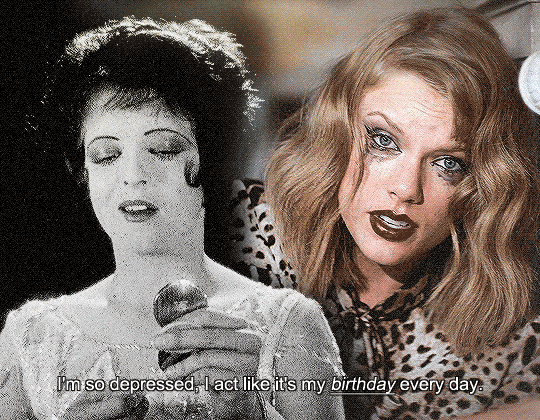
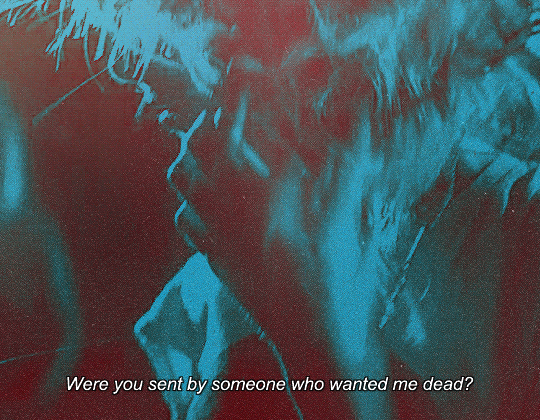


THE TORTURED POETS DEPARTMENT | TAYLOR SWIFT
A debrief, a detailed rewinding For the purpose of warning For the sake of reminding As you might all unfortunately recall I had been struck with a case of a restricted humanity Which explains my plea here today of temporary insanity
#taylor swift#tswiftedit#tswiftgif#ttpd#the tortured poets department#clara bow#. hope they make sense#I don't really know what I was trying to make#the clara bow movie is#children of divorce (1927)#flash tw#flashing images
757 notes
·
View notes
Text
i forget they’re still young in dps. like teenagers - 16, 17 years old. IT MAKES IT SO MUCH WORSE LIKE NONE OF THEM DESERVE THAT 🙏
#neil my beloved#he didnt deserve any of that ☹️#THEY WERE JUST CHILDREN.#TEENAGERS.#dead poets society#dps#neil perry#dps boys#dps movie#dead poets society movie#dead poets
161 notes
·
View notes
Text

#art#artists on tumblr#architecture#photography#aesthetic#nature#view#kafkaslordu#beautiful views#doğa#poets on tumblr#русский tumblr#too cute#photographers on tumblr#miradeniz#mayonezli#fecir#virgulleayrilmis#cirkinkadininutopyasi#ahududuluvodka#kaanbubelli#kemalistbiradam#kitty#children#peri
345 notes
·
View notes
Quote
Some mothers will do anything for their children, except let them be themselves.
Banksy
#Banksy#thepersonalwords#Children#quotes#literature#life quotes#author quotes#prose#lit#spilled ink#writers on tumblr#writing inspiration#poets on tumblr
245 notes
·
View notes
Text

i just know this man has the most insane dad lore
#does he have biological children? no. does he have 7 adopted children? yes.#dead poets society#dps#mr keating#john keating
63 notes
·
View notes
Text
WHO’S AFRAID OF LITTLE OLD ME?
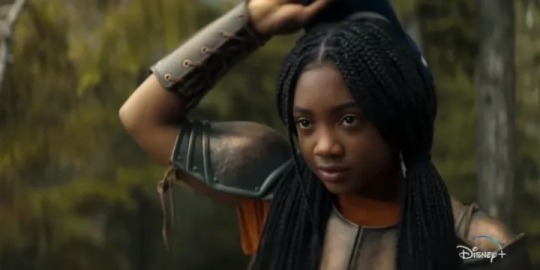
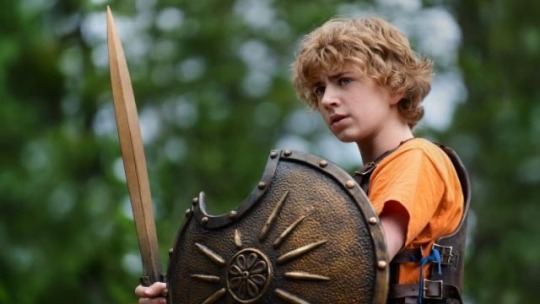
#percy jackson#pjo#annabeth chase#percy jackson and the olympians#percabeth#pjo hoo toa#pjo series#pjo tv show#pjo disney+#riordanverse#taylor swift#taylor swift ttpd#the tortured poets department#who’s afraid of little old me#otp#my little scary children
158 notes
·
View notes
Text
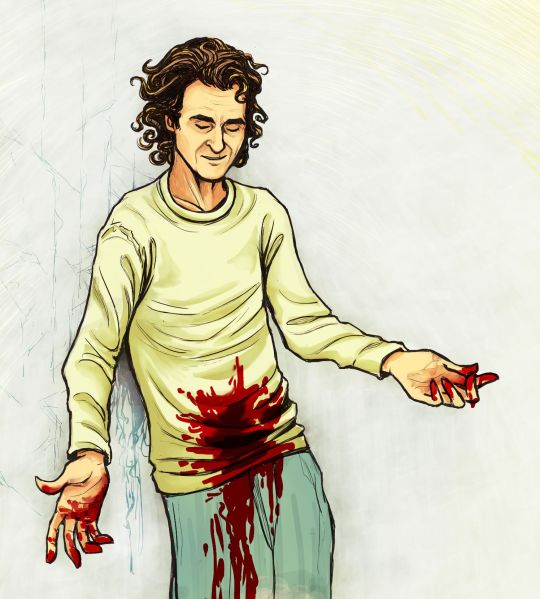
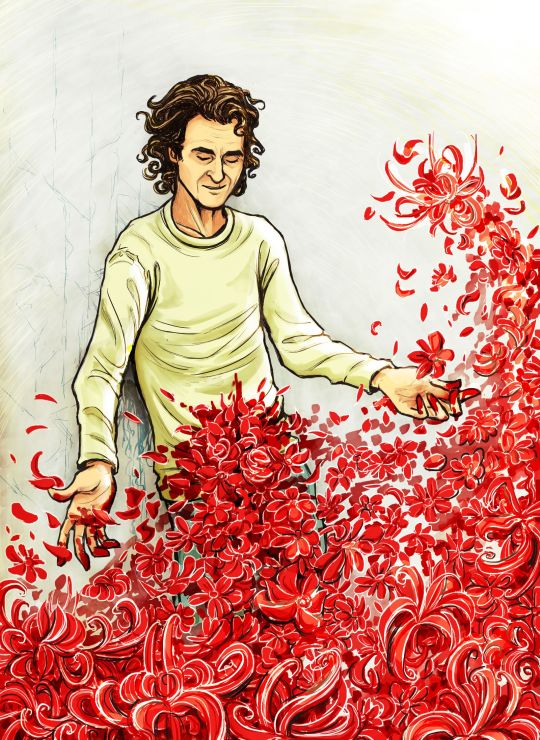
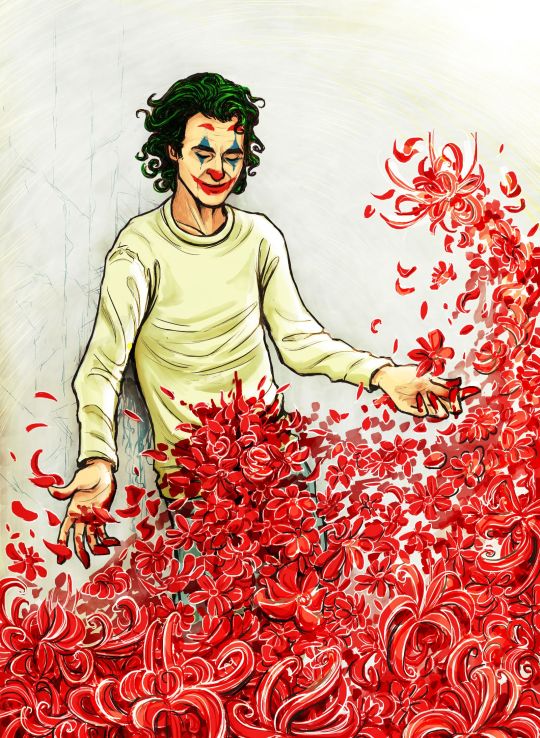
Le sang coule à longs flots de sa poitrine ouverte ; En vain il a des mers fouillé la profondeur ; L'océan était vide et la plage déserte ; Pour toute nourriture il apporte son cœur. […] Et, regardant couler sa sanglante mamelle, Sur son festin de mort il s'affaisse et chancelle, Ivre de volupté, de tendresse et d'horreur.
The blood runs in slow waves from his open chest In vain has he plumbed the depths of the seas The Ocean is empty and the shore deserted To provide food for all he offers his heart. […] And, watching his bloody breast drop On his death-feast he sinks and staggers Drunk on pleasure, on tenderness and horror.
-Alfred de Musset, La Nuit de Mai
#joker#arthur fleck#joker folie a deux#joker 2#joaquin phoenix#jokerart#joker 2 spoilers#my art#not me crying while drawing this#I'M SO SORRY TO INFLICT YOU THIS I SWEAR I'M JUST COPING#i had this image stuck in my head after seeing folie the first time and i HAD to draw it#it's like... arthur in his own head seeing his death as something beautiful#with higanbana/red spider lilies because :')#and for the poem well I remembered it while drawing so i had to include it#it’s about a pelican offering itself as food to its children#in the same way the poet uses his own sufferings to create his art for the world#romantic-core and well arthur fleck coded i guess#he is directly compared to a martyr in fàd#and if we think about the two films as a whole#isn't it the long agony of his life that is sublimated there?#and we are feasting on it?#ok i need to shut up now
70 notes
·
View notes
Text
She really got promised marriage and children at 20 and then nobody ever had the heart and courage to carry through
#taylor swift#Ttpd#the tortured poets department#And that's why we end with the manuscript#She is capable of doing everything else!!! She is the best in the biz!!!! But she can't be her own husband and children
132 notes
·
View notes
Text
Writing Notes: Speech & Language

Milestones Related to Speech and Language
Birth to 5 months
Coos
Vocalizes pleasure and displeasure sounds differently (laughs, giggles, cries, or fusses)
Makes noise when talked to
6 to 11 months
Understands "no-no"
Babbles (says "ba-ba-ba")
Says "ma-ma" or "da-da" without meaning
Tries to communicate by actions or gestures
Tries to repeat your sounds
Says first word
2 to 17 months
Answers simple questions nonverbally
Says 2-3 words to label a person/object (pronunciation may not be clear)
Tries to imitate simple words
Vocabulary of 4-6 words
18 to 23 months
Vocabulary of 50 words, pronunciation is often unclear
Asks for common foods by name
Makes animal sounds ("moo")
Starting to combine words ("more milk")
Begins to use pronouns ("mine")
Uses 2-word phrases
2 to 3 years
Knows some spatial concepts ("in" or "on")
Knows pronouns ("you," "me" or "her")
Knows descriptive words ("big" or "happy")
Uses 3-word sentences
Speech becomes more accurate, but may still leave off-ending sounds. Strangers may not understand much of what is said.
Answers simple questions
Begins to use more pronouns ("you" or "I")
Uses question inflection to ask for something ("my ball?")
Begins to use plurals ("shoes" or "socks"; regular past tense verbs, "jumped")
3 to 4 years
Groups objects, such as foods or clothes
Identifies colors
Uses most speech sounds, but may distort some of the more difficult sounds, such as l, r, s, sh, ch, y, v, z, th. These sounds may not be fully mastered until age 7 or 8.
Uses consonants in the beginning, middle, and ends of words.
Some of the more difficult consonants may be distorted, but attempts to say them
Strangers are able to understand much of what is said
Able to describe the use of objects ("fork" or "car")
Has fun with language; enjoys poems and recognizes language absurdities ("Is that an elephant on your head?")
Expresses ideas and feelings rather than just talking about the world around him or her
Uses verbs that end in "ing" ("walking" or "talking")
Answers simple questions ("What do you do when you are hungry?")
Repeats sentences
4 to 5 years
Understands spatial concepts ("behind" or "next to")
Understands complex questions
Speech is understandable, but makes mistakes pronouncing long, difficult, or complex words ("hippopotamus")
Uses some irregular past tense verbs ("ran" or "fell")
Describes how to do things (e.g., painting a picture)
Lists items that belong in a category (e.g., animals or vehicles)
Answers "why" questions
5 years
Understands time sequences (e.g., what happened first, second...)
Carries out a series of 3 directions
Understands rhyming
Engages in conversation
Sentences can be 8 or more words in length
Uses compound and complex sentences
Describes objects
Uses imagination to create stories
NOTE
The ability to hear is essential for proper speech and language development.
Hearing problems may be suspected in children who are not responding to sounds or who are not developing their language skills appropriately.
The above are some age-related guidelines that may help to decide if your child is experiencing hearing problems.
It's important to remember that not every child is the same.
Children reach milestones at different ages.
Source ⚜ More: References ⚜ On Children ⚜ Hearing ⚜ Children's Dialogue
#children#writing reference#writeblr#spilled ink#creative writing#writing tips#milestones#literature#writing notes#studyblr#writing prompt#writing#writers on tumblr#dark academia#poets on tumblr#langblr#light academia#paul peel#writing resources
685 notes
·
View notes
Text

THE WAY OF THE WORLD
Three little people from the big, big town
Gazed up into the tall, tall tree ;
“Look here ! Oh, look here !” cried they all. “How queer ;
What can those funny creatures be ?”
Wide, wide awake were the two solemn owls ;
They had slept all day at their ease.
Now they peered down below at the children in a row,
And muttered : “What on earth are these ?”
High, high from the sky the moon looked down.
“It’s very, very odd,” said he,
“That anyone should care to dwell down there
Instead of in the sky like me.”
But owls still go prowling in the deep, deep night,
When the children bundle home to their rest ;
And everyone, my dear, thinks the other one is queer.
‘T is a funny, funny world at the best.
Author : Frida Augusta Lucy Wolfe
Illustrator : Dorothy Rees
#frida wolfe#1923#poem#poet#female poets#female illustrators#owls#hibou#moon#lune#nuit#night#children#e. dorothy rees#snow#neige#winter#hiver#cold#froid#bird#oiseau#rapace#tree#arbre
85 notes
·
View notes
Text

#children#people#poetry#literature#quotes#dark academia#poem#writers on tumblr#poets on tumblr#poets#the tortured poets department#light academia
29 notes
·
View notes
Text
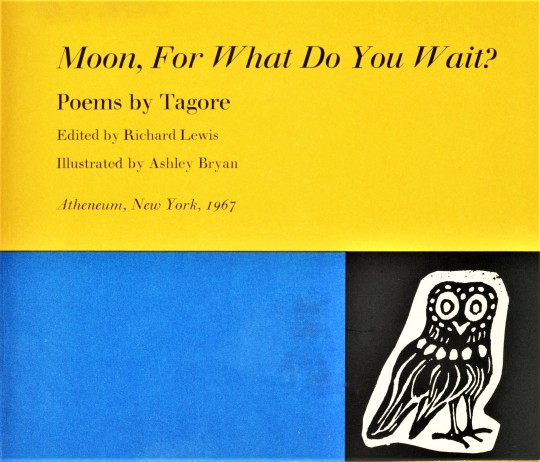
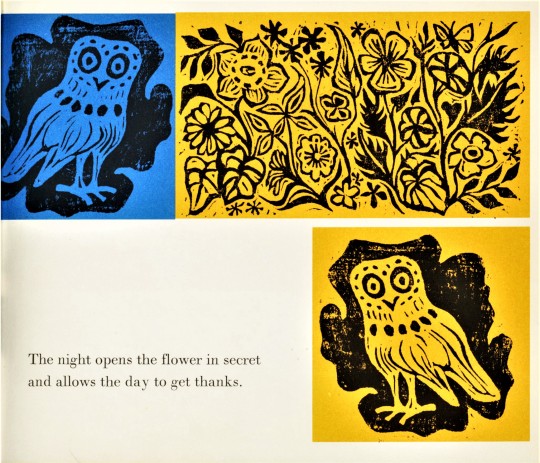

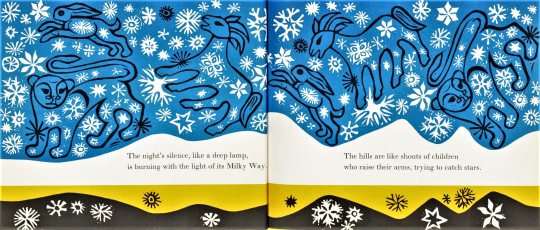
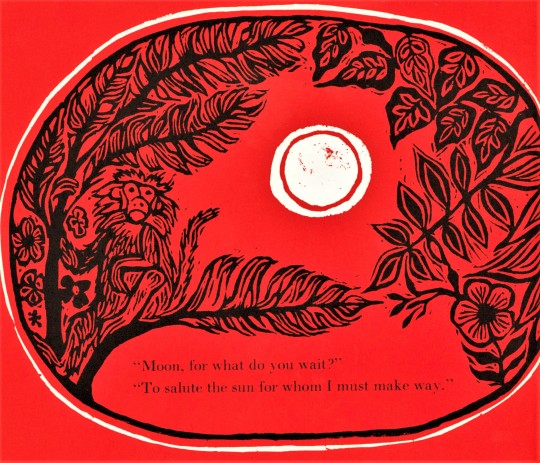
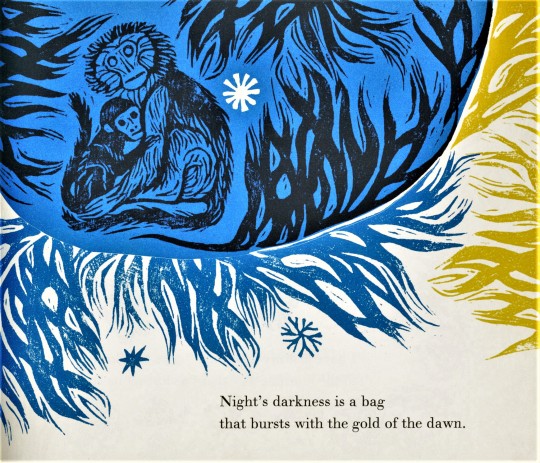



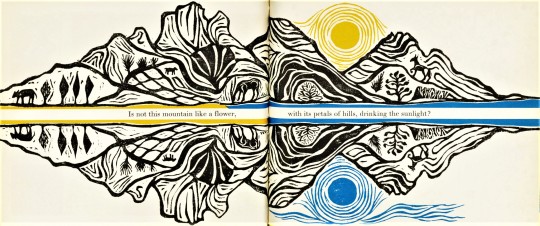
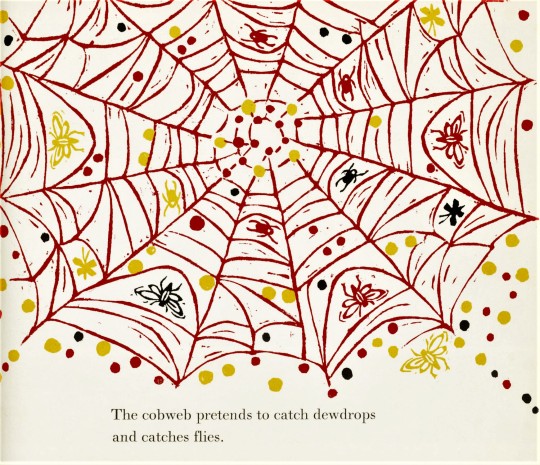

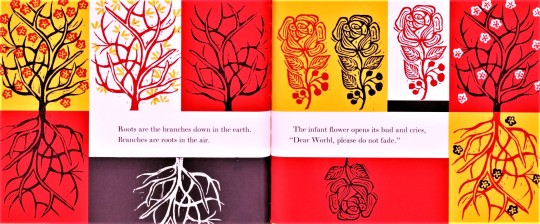
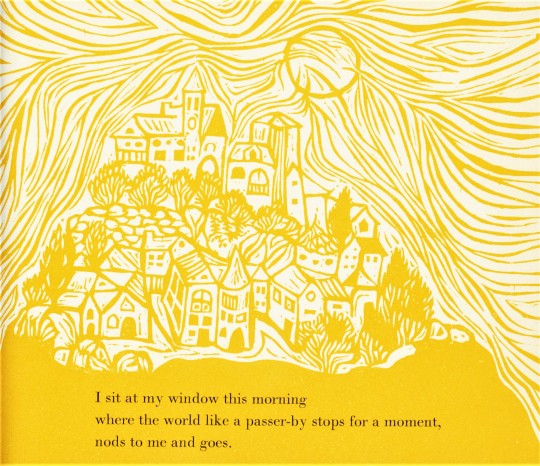
National Poets Day
On this National Poets Day, August 21, we celebrate the work of Bengali poet Rabindranath Tagore (1861-1941). Tagore began writing poetry as a child and remained committed throughout his life to exploring the natural and spiritual world through poetry and prose. He was known as the “Bard of Bengal” and in 1913 became the first non-European to be awarded the Nobel Prize in Literature for his collection of poetry Gitanjali.
Within the Special Collections we hold the first edition of Moon, For What Do You Wait?, a collection of Tagore poems from his 1916 publication Stray Birds which consisted of 326 verses. Published in 1967 by Atheneum, Moon, For What Do You Wait? was edited by Richard Lewis, director of the Touchstone Center for Children in New York City, with illustrations by award-winning artist and author Ashley Bryan (1923-2022). Lewis manages to whittle down Tagore’s lines without losing any of the imbued wonder and delight present in the original publication. Accompanied by Bryan’s bold illustrations, readers are encouraged to let their eyes wander over the pages, getting lost in prose and imagery.
View more poetry posts.
-- Jenna, Special Collections Graduate Intern
#National Poets Day#rabindranath tagore#moon for what do you wait#poets day#ashley bryan#richard lewis#atheneum#tagore#stray birds#poems#poetry#children's books#Historical Curriculum Collection
248 notes
·
View notes
Text
Celebrity worshipping stans on Twitter have become upset over Taylor Swift not posting on Twitter anymore due to the #SwiftiesForPalestine movement trying to hold her accountable for her silence. It has caused a lot of division within the fandom.
The celebrity worshipping stans who infantilise the 34-year old billionaire are extremely upset:


The fans who care about genocide and social issues also react:
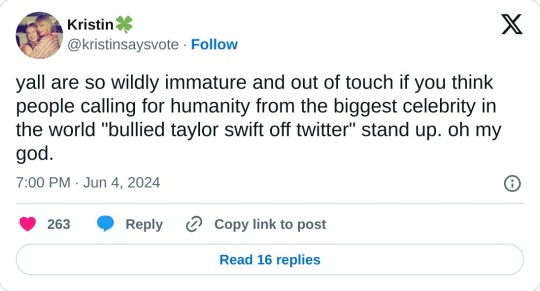

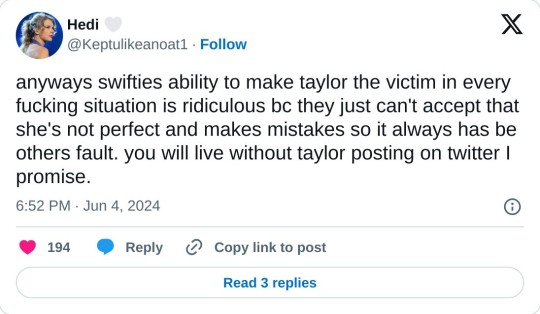


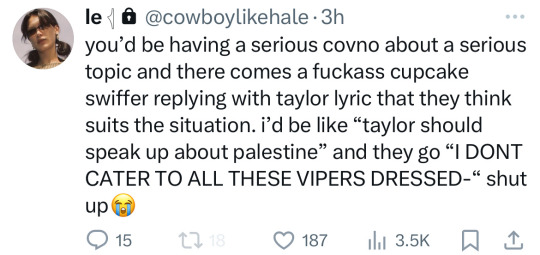
#sorry we care about children being burned alive I guess#celebrity worship is a disease#some of the people in our fandom need to log off and go outside for a minute#Kim! there are people who are dying#how are you this desperate for a tn mention or ts Twitter post#do y’all have nothing else going for you in your offline lives??#swifties for palestine#taylor swift#taylorswift#ts#free palestine#the eras tour#the tortured poets department#ttpd#palestine#gaza#free gaza#rafah#swifties for ceasefire#miss americana#activism
66 notes
·
View notes
Text
Praise what is wanted With slow �� and paced breath Observe. Watch. Witness. How others follow suit Endeavor to take time Stolen through quiet Patience Reward the expected Give consequence Oh, how the willful be willed
Deciding Embers Vol. 5, 12.4.24 “Tiny Tots Tutelage”
@env0writes C.Buck Ko-Fi & Venmo: @Zenv0 Support Your Local Artists!
#twc#spilled ink#wutispotlight#writers on tumblr#artists of tumblr#teaching#education#children#env0 write#sdeciding embers#deciding embers vol. 5#december#short poem#env0 writes#twcpoetry#writeblrcafe#poetryportal#writerscreed#abstractcommunity#savage words#smittenbypoetry#poeticstories#poetscreed#poetryriot#poets and writers#poets community
26 notes
·
View notes
Text

Happy Mother’s Day to all the beautiful mothers who provide, comfort, support, feed, cloth, soothe their babies tirelessly. It’s the hardest job in life but also the most rewarding when their little hands wrap around your neck and don’t want to let you go. Children are happiness.
.
.
HAPPY MOTHER’S DAY 💐💐💐
.
#happy mother's day#may 2024#happiness#children#soulinkpoetry#poetry#thoughts#feelings#mothers#poets on tumblr
52 notes
·
View notes